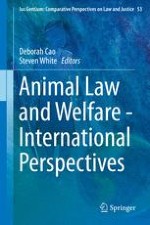2016 | OriginalPaper | Buchkapitel
3. International Animal Welfare Perspectives, Including Whaling and Inhumane Seal Killing as a W.T.O. Public Morality Issue
verfasst von : Donald M. Broom
Erschienen in: Animal Law and Welfare - International Perspectives
Aktivieren Sie unsere intelligente Suche, um passende Fachinhalte oder Patente zu finden.
Wählen Sie Textabschnitte aus um mit Künstlicher Intelligenz passenden Patente zu finden. powered by
Markieren Sie Textabschnitte, um KI-gestützt weitere passende Inhalte zu finden. powered by
